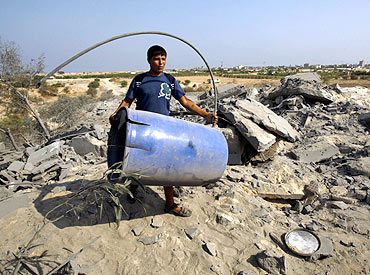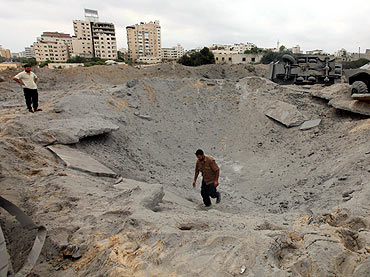
Israeli Defence Minister Ehud Barak has suggested that parts of Jerusalem could be handed over to Palestinians as the Jewish state was set to launch direct peace talks with the Palestinian leadership.
Barak categorically said the Jewish state will part with overwhelmingly Palestinians dominated parts of the city, which will be the capital of a future Palestinians state.
"West Jerusalem and 12 Jewish neighbourhoods that are home to 200,000 residents will be ours. The Arab neighbourhoods in which close to a quarter million Palestinians live will be theirs," he told the Israeli daily Haaretz.
"There will be a special regime in place along with agreed upon arrangements in the Old City, the Mount of Olives and the City of David," the Labour party leader underlined.
Hardline Prime Minister Benjamin Netanyahu, who is in Washington to begin direct peace negotiations with Palestinian president Mahmud Abbas tomorrow, has underlined that united Jerusalem is Israel's capital for eternity.
Control over east Jerusalem has been a contentious issue between Israel and the Palestinians. Even as the Jewish state considers Jerusalem its "eternal and indivisible" capital, the Palestinians seeks to make east Jerusalem the the capital of their promised state.
Asked about the possible outcome of the direct talks, Barak said that it could lead to two states for two nations, an end to the conflict and the end of all future demands, the demarcation of a border that will run inside the land of Israel, and a demilitarised Palestinian state that will be viable politically, economically, and territorially.
Text: Press Trust of India

Unfazed by a terror attack that killed four on the eve of the start of direct talks with the Palestinians, Barak has expressed optimism, saying that the courage to make "historic painful" decisions may lead to a peace agreement between the two sides.
"I believe that there is a real chance today. If Netanyahu leads a process, a significant number of rightist ministers will stand with him. So what is needed is courage to make historic, painful decisions," the defence minister said.
"I'm not saying there is a certainty for success, but there is a chance. This chance must be exploited to the fullest," Barak told the Israeli daily in an interview. The Israeli defence minister's optimism stems from "remarkable changes underway....when Arab states are competing amongst themselves in arguing over which peace initiative will be adopted by the international community", giving up their earlier rejectionist stand.
Barak, who in the past lost his brief stint as the prime minister for offering 'unimaginable' concessions for peace, also noted changes in attitude among Israelis pointing out that the most vocal critics of his "irresponsible" concessions, former Prime Minister Ehud Olmert and Tzipi Livni (opposition leader) were now on the side of peace.

On the other core issues of the conflict, the Defence Minister said Israel will keep the settlement blocs in its hands, retrieving and relocating the isolated settlements into the settlement blocs or within Israel, look for a a solution to the refugee problem [whereby refugees return to] the Palestinian state or are rehabilitated by international aid.
Unperturbed by yesterday evening's terror attack in a West Bank settlement in which four people were killed, Barak said that it was "an attempt to harm the start of the peace talks". He said looking at the situation in a level-headed way, "there is no doubt that this is an attempt to harm the start of the peace talks".
"So while we are steadfastly safeguarding our security and waging a determined campaign against the perpetrators, we cannot be deterred from working toward the success of the peace negotiations", he stressed.
The US is playing an active role in the crucial direct talks between Israel and the Palestinian leadership tomorrow in Washington, with US Secretary of State Hillary Clinton holding a first round of talks with some of the participating leaders.